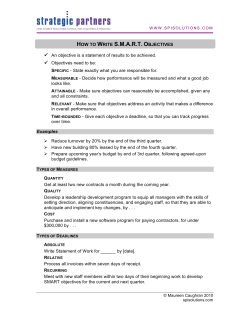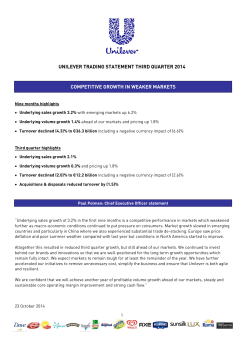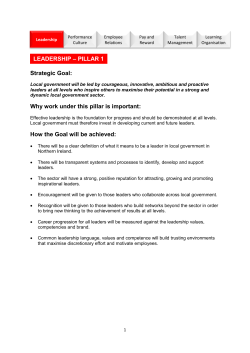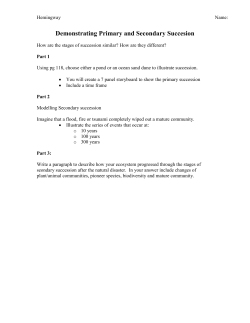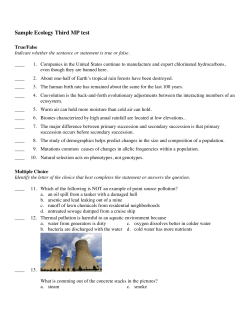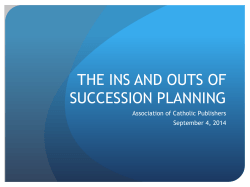
M.S. Human Resource Management
M.S. Human Resource Management The Master of Science in Human Resource Management degree program prepares students for careers in a variety of managerial and professional positions for a wide range of human resource firms. This program provides graduates with a broad base of knowledge to meet the ever‐shifting role of human resource departments as they transition from a singular focus on the administrative functions of an operation’s workforce to employee development, business leadership and strategic planning. The M.S. in Human Resource Management directly aligns with industry‐relevant guidelines as determined by both the Society for Human Resource Management (SHRM) and the Human Resource Certification Institute (HRCI). Upon completion of the program, graduates are expected to demonstrate the ability to: Apply the models and theories of Human Resource Management at both the strategic and operational levels to improve overall organizational competitiveness. Synthesize business competencies to align the human resource functions to support the organization competitiveness and strategic initiatives. Develop strategies for an internal environment of diversity and inclusion that recognizes the global environment in which the organization operates. Apply professional standards and practices for ethical conduct, legal requirements, and regulatory guidelines in the administration of human resource policies and procedures. In addition, as part of the program, students will extend their expertise in the following concepts: human resource development and succession planning; strategic compensation and benefits; strategic recruitment, selection and planning; change management; organizational behavior and strategic human resource management To be considered for acceptance into the program, applicants must possess a bachelor’s degree with a minimum GPA of 2.85. However, applicants with GPAs below 2.85 will be considered based on additional factors: coursework completed beyond the baccalaureate, reputation of undergraduate institution, undergraduate major, and current position’s level of responsibility. In addition, scores on standardized tests such as GMAT, GRE, ETS test of Business Knowledge and other nationally recognized instruments will be considered. Students who have an undergraduate GPA below 2.85 are strongly encouraged to submit a GMAT or GRE score. Other requirements to be considered for admission include two letters of recommendation and a statement of purpose describing why you want to enter the program and how you believe your previous training and experience will help you succeed. The statement should not exceed 500 words and must be submitted in printed form. To apply for the online M.S. in Human Resource Management degree, email the forms and statement to online@admissions.jwu.edu or fax to 401‐598‐4553. 1 M.S. Human Resource Management A 45 credit program leading to the master of science degree Course Title Human Resource Management Labor & Employee Relations Strategic Compensation and Benefits Organizational Training & Development Strategic Recruiting, Retention and Succession Planning Human Resources in a Global Environment Advanced Organizational Behavior Human Resource Metrics and Statistical Research Organizational Change Management Human Resource Management Capstone Total Credits Course Descriptions Course Credits 4.5 4.5 4.5 4.5 4.5 4.5 4.5 4.5 4.5 4.5 45.0 Human Resource Management: This course provides students with an overall study of human resource management. Students learn about the different personnel management systems and how each is interdependent in supporting organizational strategy. Case studies and exercises are used to provide analogous scenarios for students to apply course knowledge. 4.5 Quarter Credit Units (OL) Labor & Employee Relations: This course presents various labor and employment law issues that employers and employees confront in today’s union and non‐union corporate environments. The course surveys the effects of union organization and representation, collective bargaining negotiations, the grievance and arbitration processes, and the laws, agencies and issues impacting labor‐management relations in the public and private sector. Also discussed are various other legal issues including privacy, wages and salaries, and employee misconduct. 4.5 Quarter Credit Units (OL) Strategic Compensation & Benefits: This course reviews the fundamentals of wage and salary programs, including developing job descriptions, performing job evaluations, conducting salary surveys, adjusting pay structures, considering differentials and relating pay to performance. Benefit programs and related employee incentive and service programs are also covered. Ways to link performance to both monetary and non‐monetary rewards are reviewed, including profit sharing, bonus plans, stock options, awards and special rewards for managerial 2 personnel. Legislative restraints and tax treatments are discussed and behavioral theories are highlighted as they apply in this area. 4.5 Quarter Credit Units (OL) Prerequisites: Human Resource Management; Labor & Employee Relations Organizational Training & Development: This course examines the role of human resource development in organizations as a tool for enhancing employee performance and assisting organizations with managing change. Strategies for assessing, designing, implementing and evaluating training and organizational development initiatives that advance employee and organizational performance are analyzed. This course also explores the role of human resources in impacting executive leadership, line management and staff development. Other topics discussed include succession planning, on‐boarding, orientation, performance appraisals and coaching. 4.5 Quarter Credit Units (OL) Prerequisites: Human Resource Management; Labor & Employee Relations Strategic Recruiting, Retention & Succession Planning: This course addresses the legal, ethical and economic factors that affect recruitment, selection, placement and appraisal. Students will distinguish among effective recruiting methods using internal and external selection processes. This course also discusses the requirements for a comprehensive job analysis and the development of job descriptions. Other topics discussed include organizational exit, retention, succession planning and employee records management. 4.5 Quarter Credit Units (OL) Prerequisites: Human Resource Management; Labor & Employee Relations Human Resources in a Global Environment: This course focuses on practicing human resource management within the global context. It asks students to look at the different approaches to global HR, specifically the question of local differentiation versus global standardization for multinational and global organizations. Additionally, this course introduces students to a comparative approach to human resource management, where differences in HR approaches across the globe are discussed. 4.5 Quarter Credit Units (OL) Prerequisites: Human Resource Management; Labor & Employee Relations; Strategic Compensation & Benefits; Organizational Training and Development Advanced Organizational Development: This course introduces students to research in psychology and its application to business management. Students cover different areas of psychology (social and personality) and study the potential impact this research has on managerial decisions. Students apply this study to decisions made within the human resource management systems. 4.5 Quarter Credit Units (OL) Prerequisites: Human Resource Management; Labor & Employee Relations; Strategic Compensation & Benefits; Organizational Training and Development; Strategic Recruiting Retention and Succession Planning; Human Resource Management in a Global Environment 3 Human Resource Metrics & Statistical Research: This course introduces students to the measurement and assessment of human resource initiatives. It provides students with an understanding of how to develop appropriate metrics to measure the impact of human resource management initiatives. These metrics include both qualitative and quantitative means, with a focus on ensuring a demonstrable return on investment for the organization. Students also study how to support and advocate for changes to these systems based on quantitative and qualitative measures. 4.5 Quarter Credit Units (OL) Prerequisites: Human Resource Management; Labor & Employee Relations; Strategic Compensation & Benefits; Organizational Training and Development; Strategic Recruiting Retention and Succession Planning; Human Resource Management in a Global Environment Organizational Change Management: This course incorporates the literature concerning change management and its implementation. Students study the theory and research in change management. A part of this study will be the understanding of change at both the organizational and individual levels. Students are also asked to apply this research as they develop human resource initiatives that support change initiatives. 4.5 Quarter Credit Units (OL) Prerequisites: Human Resource Management; Labor & Employee Relations; Strategic Compensation & Benefits; Organizational Training and Development; Strategic Recruiting Retention and Succession Planning; Human Resource Management in a Global Environment; Advanced Organizational Behavior; Human Resource Metrics and Statistical Research Human Resource Management Capstone: The capstone course for human resource management integrates the knowledge and skills acquired through the program to examine how a human resource professional can impact employee and organizational performance, as well as the strategic management process. Many of the major areas in the human resource management field are revisited. Theories and best practices are analyzed for dealing with the dynamic circumstances organizations are confronting in the 21st century, many of which are significantly influenced by factors such as increasing globalization, employee mobility and constantly evolving laws and technology. Students further incorporate their knowledge and skills by developing a comprehensive, strategic human resources plan for an organization. 4.5 Quarter Credit Units (OL) Prerequisites: Human Resource Management; Labor & Employee Relations; Strategic Compensation & Benefits; Organizational Training and Development; Strategic Recruiting Retention and Succession Planning; Human Resource Management in a Global Environment; Advanced Organizational Behavior; Human Resource Metrics and Statistical Research 4
© Copyright 2025
